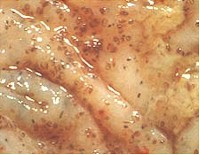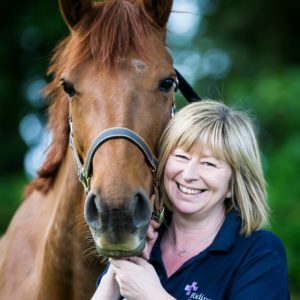Encysted redworm is one of the most dangerous worm burdens a horse can have but regular and targeted testing and treatment can reduce the risk and keep your horse protected. Resistance to wormers is a big problem at the moment with little regulation of what is being prescribed so where 15 years ago it was the norm to routinely give wormers every 12 weeks we are now recommending a testing and risk based approach in order to protect the wormers for future use.
One of the main reasons why worming can be so confusing is all the different names that are given to the same worms! The worms also go through a life cycle on the pasture and within the horse and different stages of the life cycle are treated at different times of year.
Encysted redworms may also be known as small strongyles or cyathostomins. They are ingested by our horses when they are in the larval stage on the pasture. They reach the large intestine where they go through several larval stages and eventually they burrow into the deeper layers of the gut itself and become 'encysted' . The development of the larvae may stop at this stage and rest for a period of time in the lining of the large intestine. The most dangerous stage of the life cycle is late winter/early spring when these larvae mature into adults and emerge into the large intestine. If there are large numbers of the encysted larvae this can cause serious damage to the lining of the large colon as well as causing a physical blockage. This causes serious disease characterised by severe diarrhoea and weight loss. This tends to affect younger horses (below 5 years) much worse and the prognosis is guarded at best with many horses dying from this disease.
In order to prevent this serious disease at this time of year we are thinking about worming for the encysted stage. Regular worm egg counts throughout spring and summer helps us to determine your horse's individual level of risk for encysted redworm, along with a knowledge of your horse's general health status and yard management. This is why we feel as your vets we are best placed to provide you with the advice you need for worming. To prevent disease and also the prevent unnecessary over treatments.
Moxidectin is the only drug which will treat the encysted stage of redworms. Some wormers (e.g. equest) are moxidectin only products but you can get wormers with more than one drug in. Depending on your horses worming history they may also need a drug that works against tapeworm at this time of year (e.g. praziquantel, included in equest pramox along with the moxidectin). You can do a test for tapeworm which is done at home by yourself and involves collecting a saliva sample. Please contact us for a testing kit. If your horse has had at least 4 worm egg counts this year which have all come back as low you may not need to worm them for encysted redworm and a blood test can help determine if this is necessary. Please contact us if you would like to discuss this further.
Please call our office on 07747771182 if you would like to sign up for our worming plan for next year which includes discounts on wormers, worm egg counts and all the advice you need from your own vets.

